Navigating a financial maze
After community pushback, AISD doubles back on seven-of-eight schedule
English teacher Diana Adamson is among many others at McCallum and in AISD who was surprised by AISD’s decision to revoke the 7 out of 8 plan.
After receiving pushback from teachers, parents and students, superintendent Stephanie Elizalde announced during a board meeting that AISD will not require teachers to instruct seven of eight classes for the 2022–2023 school year. For those closely monitoring the issue, this proposed—but ultimately scrapped—schedule change is just another part of the district’s quest to balance its budget and combat its ever-looming financial woes.
BUTTING HEADS WITH THE BUDGET
AISD is currently facing a $62-million budget deficit and an inability to tap into any more of its cash reserves to alleviate it. The shadow of that reality has continually prompted concern about how the district would reduce its deficit next year. Proposed schedule changes—including moving away from the eight-period block schedule or taking away one teacher planning period—have been faced with strong opposition from teachers, parents and students, who claim that these changes would severely harm instruction and teacher well-being.
As far as what’s driving the sudden scramble for funds, assistant principal Andy Baxa explains that AISD’s current budget problems are heightened by the fact that AISD’s bond ratings will drop if the district continues tapping into its reserve funds and running a budget deficit.
“There was a deficit for this school year, and they’ve made up the funds through a surplus fund that we could tap into,” Baxa said. “But the reserve has been depleted now to the point where, if you’ve listened to the last couple board meetings, they’re concerned that if that fund continues to be depleted, it will start affecting their bond rating and their ability to generate capital for physical improvements down the road.”
Part of the reason AISD is so short on funds is its increased recapture payments and decreased enrollment. In the state of Texas, school districts with higher property values are expected to pay back a portion of their funds to the state, who then “re-distribute” these payments to more rural, property tax-poor school districts. This policy, meant to promote educational equity, is known as recapture. According to chief financial officer Eduaurdo Ramos at the Feb. 10 meeting for the AISD Board of Trustees, as property values in Austin have gone up, so have expected recapture payments, increasing from an estimated $709 million to $761 million. Further, Ramos explains, the recapture payment was calculated assuming AISD was at a 96% daily attendance rate, when in reality, AISD’s daily attendance rate has dropped to around 92%, with the first month of the spring semester dipping as low as 80% daily attendance due to the omicron variant. These coupled phenomena have placed AISD in a less-than-ideal situation, where it is receiving less state funding due to decreased attendance while simultaneously being expected to pay back more due to increased property values.
We know our system is not working as intended. We are doing our best to advocate for our students in our district and across the state as far as what can be done, and how we can tweak the formula.
— chief financial officer Eduaurdo Ramos
Ramos believes that the current state of recapture, with AISD being expected to pay back 53% of local tax collections to the state of Texas, isn’t sustainable.
“We know our system is not working as intended,” Ramos said. “We are doing our best to advocate for our students in our district and across the state as far as what can be done, and how we can tweak the formula.”
Trustee Kevin Foster agrees with Ramos. Foster hopes that others in the legal and legislative spheres can help the district get out of its current predicament.
“I, for the life of me, cannot say the words ‘Independent School District,’” Foster said at the Feb. 10 board meeting. “I don’t understand the designation anymore. How are we independent when we raise money and the state takes more than half of it, and then puts ridiculous restrictions on us regularly and predictably? My hope is that the people smarter than me in the legal and legislative realm find the ways to push back against what is an absolute, undeniable injustice.”
Despite the challenges recapture poses, Ramos remains confident that by the end of the 2021–2022 school year, AISD will have a balanced budget. Actions for the 2022 fiscal year, which together are expected to generate $23.6 million in savings, include evaluating and eliminating vacant positions, implementing a hiring freeze when applicable, districtwide teacher leveling and a change in district policy for travel and cell phone allowance.
In wake of the decision not to switch to a seven-of-eight schedule, Elizalde has also announced that the district would reduce central office staff.
“We are re-doing our proposals that will include keeping six of eight across the board as it currently exists,” Elizalde said. “There will still have to be some trade-offs; there are quite a few. But the biggest one that I want to highlight is that we will have to reduce our central staff by about 250 individuals.”
Elizalde stated that she would help the individuals who are being laid off from central office find new positions. Accordingly, the 2023 fiscal year budget “prioritizes” compensation increases, including a $16/hour minimum wage for classified employees and bus drivers, a $1,000 base pay increase for teachers and a 2% increase in teacher salaries.
A SISYPHEAN DILEMMA
The decision not to follow through with the seven-of-eight schedule can, at least in part, be attributed to community feedback. Despite the rapid proposals and subsequent cancellations of new schedules, Elizalde said that she continues to appreciate the community feedback and that she will continue to prioritize laying off as few people as possible.
“It is very clear to me given our feedback that we’ve received that seven out of eight is not palatable. It’s not something that can be sustained, even for just a year,” Elizalde said. “One of the premises that I utilize is ‘How few people can I tell, due to programmatic changes, that they won’t have a job in ‘22–’23?’ Whether that’s right or whether that’s wrong, I do want to share that, initially, it’s all about, ‘How can we say goodbye to the fewest number of people in our organization?’”
While teachers can breathe easier knowing that they won’t be missing out on their planning periods and AISD will, in theory, balance its 2021–2022 budget, Elizalde expresses that AISD is still caught in a financial labyrinth.
“It is a fluid, very messy, very uncomfortable situation, and I want to acknowledge that,” she said at the Feb. 10 meeting. “I also want to acknowledge that we are in a tough spot. We’re in a very tough spot.”
PUSH-BACK AND LOOKING ONWARD
When English teacher Diana Adamson listened to the Feb. 10 board meeting, she was shocked.
“Honestly, I didn’t expect anything to change,” Adamson said. “I was listening to the board meeting last night and was like ‘Wait, did I hear that right?’”
After registering her initial shock at the district’s doubling back, Adamson expressed her feelings of discontent with how Elizalde handled the entire situation.
“I feel like what happened was that our principals were really put on the spot,” Adamson said. “And then, after everything blew up, our superintendent came down as the hero, saying ‘We’ve changed. We’ve listened to you.’ And I’m still kind of waiting for the other shoe to drop.”
Social studies teacher Kristen Wachsmann conveyed her feelings of reassurance in the fact that so many community members openly opposed the seven-of-eight schedule shift. However, she also communicated her lingering doubts and eroded trust in the district’s dedication to protecting teachers.
“I definitely have doubts,” Wachsmann said. “I think this proposal broke trust between me as a teacher and the district. So while I’m hopeful we’ll move forward with a sustainable system, I don’t trust we will.”
I think this proposal broke trust between me as a teacher and the district. So while I’m hopeful we’ll move forward with a sustainable system, I don’t trust we will.
— social studies teacher Kristen Wachsmann
Similar to Wachsmann, English teacher Nikki Northcutt’s trust in the district has been eroded.
She said that the seven-of-eight proposal—even though it will not come to fruition—remains the final straw in a long back and forth of whether or not she should quit teaching.
“Seven of eight, that whole thing: it gave me a really easy excuse to say my decision was made,” Northcutt said. “Now, it’s back to being not an easy decision. But I’m really looking at my pro-con list, and the cons are just leaking off the page. I gave it a weekend to ponder it, and I just don’t have any trust left.”
Moving forward, Adamson stressed a desire for increased transparency and a more structured plan.
“Things feel wishy-washy right now and people are tired of not knowing what’s next,” Adamson said. “Whether it’s COVID or classes, I think people need a sense of stability. And I just don’t feel like we always get that.”
— with reporting by Morgan Eye, Madelynn Niles, Samantha Powers, Lanie Sepehri and Francie Wilhelm




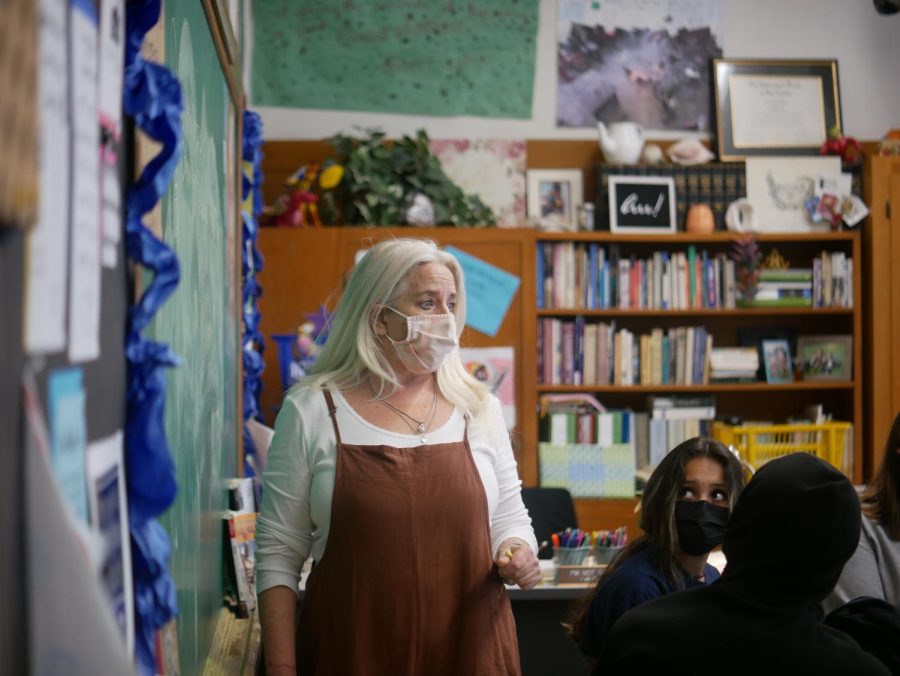
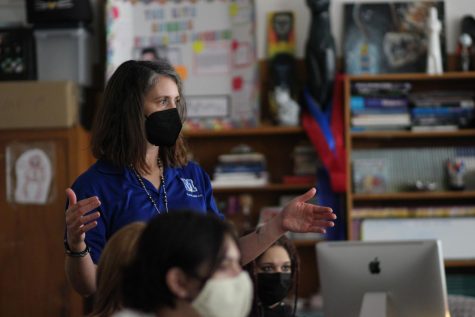
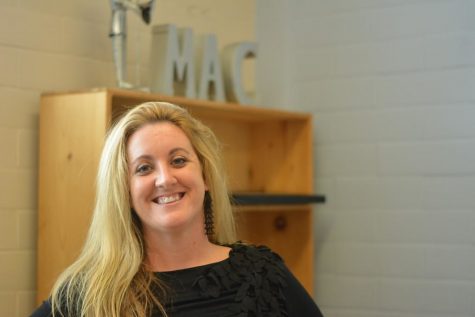
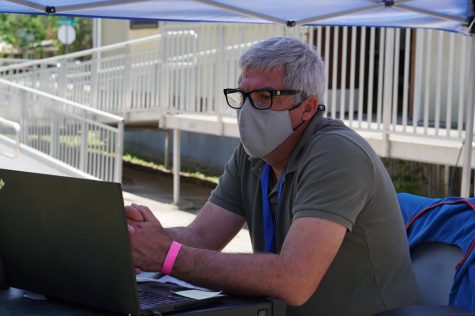












![With the AISD rank and GPA discrepancies, some students had significant changes to their stats. College and career counselor Camille Nix worked with students to appeal their college decisions if they got rejected from schools depending on their previous stats before getting updated. Students worked with Nix to update schools on their new stats in order to fully get their appropriate decisions. “Those who already were accepted [won’t be affected], but it could factor in if a student appeals their initial decision,” Principal Andy Baxa said.](https://macshieldonline.com/wp-content/uploads/2024/04/53674616658_18d367e00f_o-600x338.jpg)
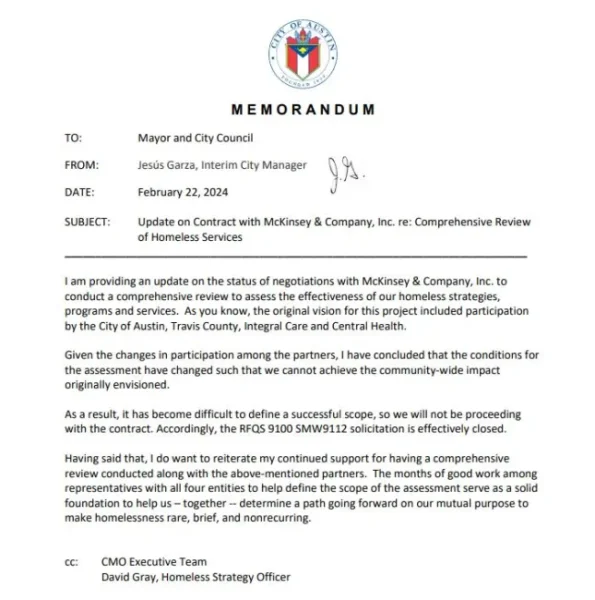


Max Davis • May 16, 2022 at 1:48 pm
I really like this article because it shows the opinions of lots of different people
Nate Williams • Feb 23, 2022 at 12:36 pm
I really liked this article because you allowed the viewpoints of from students to be heard and their perspectives shown. I learned a lot from this article.
grace • Feb 18, 2022 at 2:44 pm
This article was very well written. I think it accurately depicts the struggle happening within AISD right now. I loved how you showed the reactions and points of view of many involved, from the superintendent to the teachers. I agree with Ms. Adamson, I don’t things are definite enough within the administration to gain a sense of stability. I definitely learned something today.